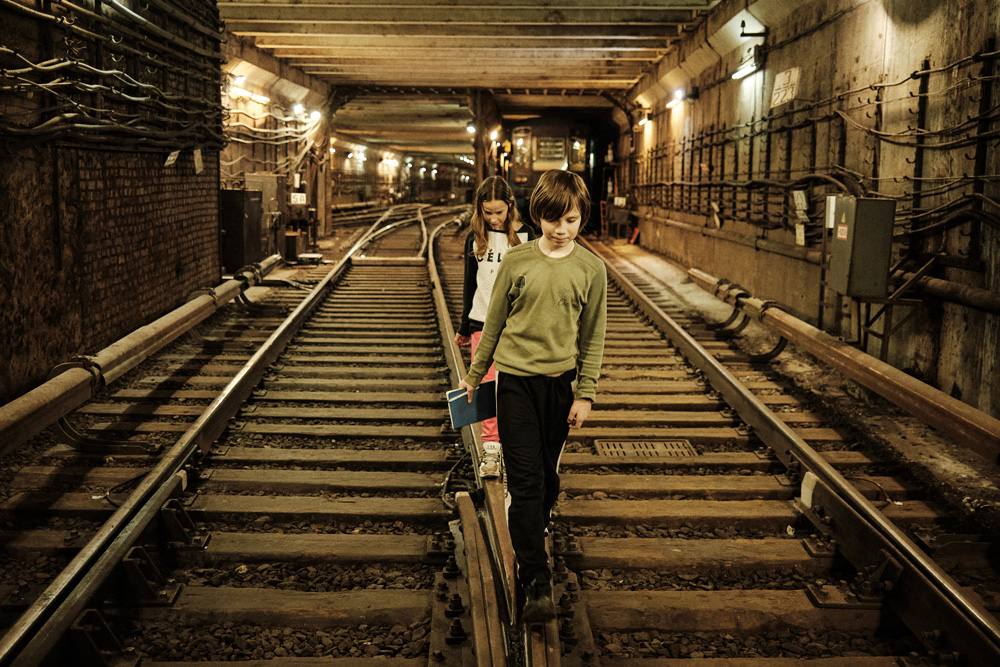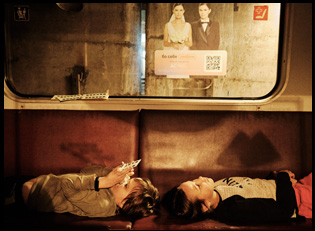After becoming friends in film school, Ivan Ostrochovský and Pavel Pekarčík found they were quite complementary of one another, and in ways that might not make sense to their other classmates.
“When you go to [film in] the war zone, it’s very important what you can expect from the other guy, and Pavel is a mountain rescuer, so when I was shot, Pavel has every medical [device] for this,” Ostrochovský said of their nearly three-decade collaboration.
“Yeah, I always have medical aid and Ivan has this bulletproof [vest], so I can hide behind him and I feel pretty safe, Pekarčík adds with a laugh. “Because we know each other and what we can expect, [our partnership] is like a warm hug.”
That warmth between them comes to be a key ingredient in “Photophobia,” a unique look at Russia’s invasion of Ukraine that, aside from opening on the streets of Kharkiv after it’s been blasted to bits, Ostrochovský and Pekarčík avoid the violent spectacle entirely as they duck below ground at a subway station for safety. However, that isn’t to suggest that you don’t see the impact the war is having as they are surrounded by over a thousand others who have taken shelter in the subway systems with its stopped cars now serving as makeshift homes with benches turning into beds and the platforms turned into public squares. It takes imagination to survive, which is why the filmmakers would seem to gravitate towards those with the biggest ones in the young Nikita and Vika, whose parents will sneak off to check in with friends and relatives on their cell phones and let the kids be kids, allowing them to think of this refuge as an adventure.
The film takes its title from the fact that no one is allowed upstairs when the echoes of gunfire and bombs can be heard throughout the metro station — a doctor goes so far as the prescribe vitamin D to make up for the lack of sunlight for the people living there. But the denizens make create their own brightness, whether it’s the children who busy themselves with games or an elderly troubadour who pulls out his guitar to entertain and that spirit is what Ostrochovský and Pekarčík lean into as a tragedy unfolds above, allowing glimpses through the View Master that Nikita has lying around to envision what the child can only suspect is happening with his limited experience of the outside world. Those on screen may have a limited perspective when to know more would put them at great risk, but in showing those who have been displaced by the invasion with no obvious path towards a return to more normal times, “Photophobia” offers a more complete picture for those on the outside looking in, illustrating the casualties of war that can’t be accounted for statistically.
After premiering at the Venice Film Festival’s Giornate Degli Autori sidebar this past fall, the undeniable power of Ostrochovský and Pekarčík’s hybrid was recognized by their native Slovakia when the country made it their official selection for this year’s Oscar race in the Best International Feature category and recently the two graciously took the time to talk about how the film was a result of shifting gears in how they wanted to cover the war, earning the trust of their subjects by spending time with them and breaking through the natural apathy that sets in with a war that continues to go on.
Ivan Ostrochovský: When we [went to Ukraine] we started to shoot in March, one month after the war started, and we went to Kharkiv, because it’s the second biggest city in Ukraine [with] 1,500,000 [people]. And in this time, the Russian army was already very close to city, one kilometer probably, and [originally] we wanted to film a zoo because the people working there were hiding in the animal cages, and Kharkiv has two zoos, [with] one very close to frontline [where the trainers stayed to] evacuate the animals and five people died during this. But when we were waiting to shooting at this zoo, we found this metro [station], and as filmmakers, [we realized] this very specific situation [where] it was 1,500 people in one place and every single people in this metro had to have a good story and you could shoot 1,500 movies. We chose to make a movie about the kids because the adults were depressed, but these kids was very happy – maybe too much – but it was a totally different emotion and when we went to Ukraine, we knew we didn’t want to shoot a big, heroic story. It’s very hard [to make a film] about kids in war and I don’t like pushing for emotion, so we wanted to find very small human things in the every day and ordinary people and in this metro, there was everything.
Did Nikita catch your eye pretty quickly as a main subject?
Pavel Pekarčík: It’s a little bit problem to shoot 1,500 stories – for Ivan, it’s easy, but in reality, it’s not so easy. And the people were pretty nervous [around] journalists. Every day, some journalist [came and left] underground and you’d be pretty nervous from that, because when you sleep and you wake up, you’re looking into some lens and the next day, another one [is there]. [They even wrote] on the wall a crossed-out camera.
Ivan Ostrochovský: No shooting. But we slept there with the people.
Pavel Pekarčík: Yeah, we spent all the time with them and they no longer saw us as some foreign artifact. We started to be invisible. And Ivan is a [tall] guy, so for him being invisible is not so easy thing. But after three weeks, we had stayed there with a family, talking with them and we became so close and that was Nikita’s family, so we started to shoot with him and we knew we had our main hero and we could start shooting freely because they don’t look on us like some weird part of the reality.
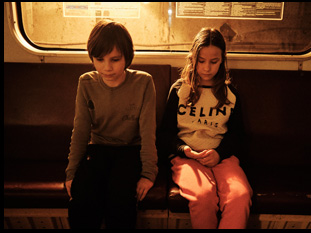
Pavel Pekarčík: We just tried to imagine how the kid could imagine the war because in reality, you are underground and you don’t see anything that’s happening outside. You can hear from the parents [some information from the outside] from some telephone calls, and we were thinking you have pictures from outside, just from small stories and Super 8 is a perfect medium for that because you just close your eyes and imagine your parents on old Volkswagen going surfing somewhere.
Ivan Ostrochovský: In Slovakia, 8 mm films are a [nostalgic] format. Because in old times, you shoot weddings or the birth of a child or nice family moments and we should think these war moments are now family memories for the future.
Pavel Pekarčík: And at the metro station, when you are underground, you have 1,500 people who are all a bit depressed and after three days, you would be happy to go outside. And we [ourselves] invited every possibility when we could go to help somewhere on the front line and it was a paradox because on the front line we would evacuate people or [help them to] hospitals, but for us, those were our moments of freedom. You are outside, the sun is out, and you are senses are going crazy. And on this road, we found always some kind of situation like you see in the Super 8 [footage]. It’s all [filmed] close to Krakow.
Did Vika enter the film like she enters Nikita’s life or did you know about her early on?
Ivan Ostrochovský: When we started shooting in the metro, there was the possibility that the army would evacuate these people more kilometers [away] from front line, so we didn’t know if we’d have two days, one week or one month for shooting. We wrote like a very [simple] script, like a girl and boy meet each other, start a friendship and want to go out because Nikita went five months without sun. We went totally crazy when we stayed in the Metro [for a few days], so I do not understand how it is possible to stay there five months.
Pavel Pekarčík: And Vika was in the metro at the same time as Nikita and there was also the cowboy who played the love songs who was very important. He was like a magical grandpa [who brought] the theme of the love or closeness to the film [with his songs] and [the fact he’s] 86, still looking for love in Metro. And he is a master flirt.
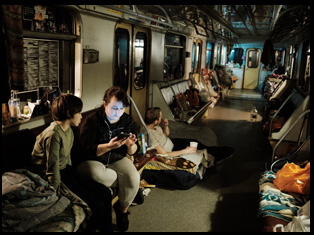
Pavel Pekarčík: If we had more time, we could shoot whole movie the observational way, but we didn’t have so much. That means [we had to make more of a hybrid where] some time there is little bit acting. But for us what was pretty nice was when you build the story and there’s authenticity [within that] construction.
Ivan Ostrochovský: I never thought we would be there for three months. And if I knew we had three months, maybe we would shoot a little differently because it’s a complicated story and the story ]we present] is very [simple]. I also never thought the people there [would be there that long].
Pavel Pekarčík: Yeah, Nikita was inside the Metro on the 25th of February and left the 26th of December.
Ivan Ostrochovský: We [filmed] this in April and May, 2022 and I never thought [on] December 23, the war would still be going on. This is very surprising for me.
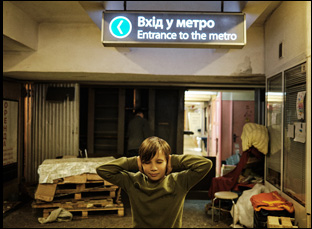
Ivan Ostrochovský: It’s very important for us. we’ve already made a lot of movies before, but they are not as important as this film because the war is long, [now nearing] two years and people are losing the emotion and they tend to forget or not as interested in the war as they were at the beginning because it has disappeared from the front pages. People are tired, but it’s logical when every day for two years, [you are bombarded] with information. But we hope this film is from a little different point of view, thinking about this war, not the tanks and [the violence] but how the kids and [civilians] who have to live. I don’t think the people who watch only TV [news] have this kind of emotion.
Pavel Pekarčík: And for me, it’s also very important because when you see this on your own eyes, this mass destruction is so fucking big. When we were outside at night, it was like what you see in movies from the Second World War on the Eastern front, so every word what we can [relay] so they can re-imagine the destruction [for themselves] and we can activate them is the best thing [we can do].
Ivan Ostrochovský: Like we don’t want to push [audiences] for emotion. We want to push for the Pentagon to send more arms there.
Pavel Pekarčík: We are pushing for rockets.
“Photophobia” does not yet have U.S. distribution.




